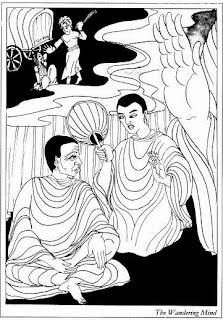The Wandering Mind
ONCE THERE WAS A YOUNG MONK named Sangharakkhita. While he was staying
in a village monastery he was offered two robes and decided to offer one of them to his
uncle who was also a monk and whom he held in high esteem.
When he tried to present the robe to his uncle, however, his uncle
refused to accept it, saying that he already had the robes required. The
young monk interpreted his uncle’s refusal as a personal affront. He felt so
offended that he decided on the spot he would rather disrobe than be a part of
an order where there were such arrogant monks as his uncle.
Sangharakhitta wanted to leave the monastery right away but his uncle
asked him to stay and fan him a while since it was a very hot
day. Sangharakhitta did as his uncle asked, but did so more out of a sense of
duty than out of deference, for he was still brooding over his uncle’s refusal
to accept his gift. And as he fanned his uncle, his mind started to wander.
“What will I do,” he thought, “as soon as I become a layman again?”
Well,
first he was going to sell the robe and buy a she-goat. The she-goat would then
give him many more goats and he would sell them and finally save enough money
to get married. Soon his wife would give birth to a son and they would go to
the monastery to show him off to their uncle. On the
way,
however, an argument would ensue between them, for he would want to carry the
child as he drove the cart, but his wife would insist otherwise. As he would
make a grab for the child, it would fall off the cart and get run over by one
of its wheels. He would then be so upset that he would start beating up his
poor wife.
At that point of his daydreaming, he accidentally struck his uncle’s
head with the fan. The old monk who was able to read Sangharakkita’s thoughts
admonished him, saying, “It’s not enough to beat on your wife? You’ve got to beat on
an old monk as well?
Sangharakkhita
was so surprised and ashamed when he realized that his uncle had been reading
his mind that he wanted to run away. Instead, the good uncle took him to see
the Buddha.
When told
what happened, the Buddha spoke gently to the young monk and said, “The mind
can wander off and think of things that have not yet taken place. It is best to
concentrate on the present instead and strive diligently to free oneself from
greed, hatred, and delusion.”



No comments:
Post a Comment